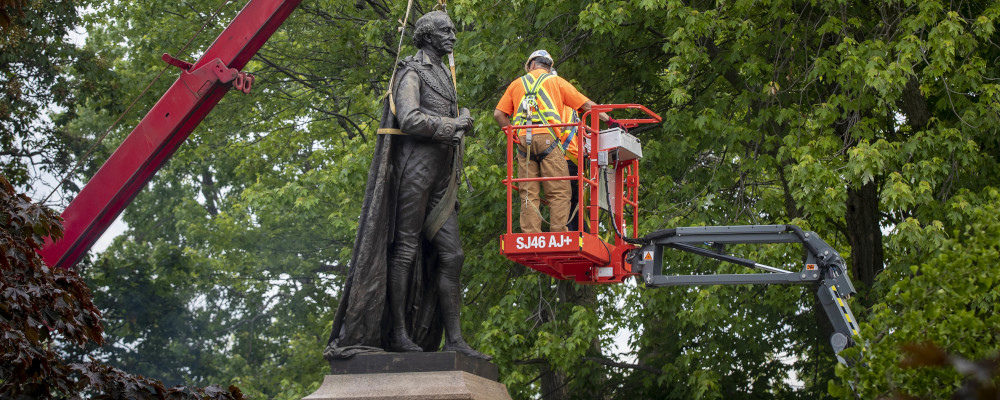By all accounts, there was much weeping among Liberals as the new Canadian flag was hoisted above the Peace Tower for the first time on February 15, 1965.
Perhaps I lack imagination, but it’s hard for me to understand why the new banner, which evoked no memories, no deep associations, would inspire such emotion. By contrast, I can understand John Diefenbaker’s tears, shed quietly away from the crowd. The former prime minister had fought for months against the new flag, drawing on deep reserves of rhetoric to compensate for his party’s lack of numbers in the House, and condemn the erasure of Canada’s past.
So bitter was the flag debate that by the end some of Diefenbaker’s own MPs whispered that it had changed him, that his passion had curdled to bile as he saw the growing inevitability of defeat.
After voting with the government to impose closure, Conservative MP Paul Martineau rose to address the chamber in a speech that Peter C. Newman, reflecting his anti-Diefenbaker bias, called “the best speech of the entire debate.” Martineau said that he regretted that “many hard and bitter words have been spoken that it would have been better to have left unsaid” and explained that he had voted to end the debate because to let it go on would risk “the very destruction of this country.” It was a weak, if genuine, apologia for betraying his party’s cause.
If it is hard for most Canadians today to appreciate why the flag debate was so divisive, that just shows how complete the victory was. Once symbols or language are changed, it becomes harder to see, let alone understand what came before. That is why revolutionaries try so hard to remake the trappings of society: to change the flag, the calendar, the way we describe our world, the way we keep time, and above all the language. This deliberate disorientation is intended to make dissent not just impossible but literally unthinkable.
But to get a sense of why Diefenbaker and so many others fought so hard, try to imagine a new conservative government proposing to reverse the decision, replacing the now-familiar red and white flag with the old Red Ensign or the Union Jack. The reaction today would be as angrily uncomprehending as it was for so many in 1964. The reason is obvious: a flag symbolizes a country and its people, so changing the flag implies a change in the country and perhaps even in the people themselves. If you disagree with that change, it’s not just a symbolic affront — it’s personal.
Today, the flag debate would be described as part of the “culture wars,” a dismissive term usually accompanied by the words “unnecessary” or “distracting.” It would be lumped in with the debate over statues of Sir John A. Macdonald, or whether you sing the old or new English lyrics to “O Canada.”
This says more about the priorities of our media than of our country. The anger the flag debate evoked on both sides should cause us to reconsider the easy dismissal of “culture wars” as secondary to politics.
I would go further. Culture wars aren’t a political sideshow, they are the essence of politics. They define the community and establish a shared identity.
- To whom do we raise statues, and whose statues do we tear down?
- Do we honour our ancestors or condemn them?
- Do we name buildings after dead leaders or engage in damnatio memoriae, giving our whilom heroes the Hatshepsut treatment?
- What do our cities look like?
- What is the value of life and who decides when it begins and ends?
- What do we tell our children about ourselves, and do we teach them to love beauty in art, literature, and music and to respect the wisdom of the ages?
These are the core questions of politics. Squabbles over tax rates and infrastructure funding are trivial next to them. Economic matters hit our bank accounts, but questions of identity hit us in the gut.
English historian Dominic Sandbrook agrees. “Centuries from now, people won’t be arguing about taxes and spending. These are merely our own contemporary obsessions, which would baffle our ancestors and bemuse our descendants. But flags and statues, history and identity? That’s what politics is really about.” In other words, culture wars are politics; the rest is accounting.
The political Left also agrees, which is why they are so quick to denounce things they disagree with as “not who we are” and to dismiss their opponents as being “on the wrong side of history.” These are powerful rebukes because they cut to the heart of politics, which is our place in the collective. Are you in or out? Friend or enemy? What could be more important?
This may sound odd in a country where most of our recent elections have been fought over taxing and spending, rather than the fundamental questions that are still actively debated in our peer countries, like immigration levels. But all that tells us is who is winning the culture wars. The spoils of political victory include the power to set the limits of internal disagreement, and our progressive political, academic, media, and judicial elites have declared most controversial cultural issues beyond the pale (matters touching on Quebec’s distinct identity being the telling exception). There is no more final political victory than redrawing the boundaries of acceptable social discourse to exclude your opponents.
Occasionally, however, a new cultural question does emerge and galvanizes both sides, drawing the latent energy unspent on other cultural battles. A recent example is the federal attempt to impose a uniform state childcare policy on the provinces. On the one hand, the Liberals (with the support of the other progressive parties) favour a model of childcare that sees parents first as units of the national GDP and secondarily as child-rearers; on the other side, some conservatives believe that the balance between work and childcare, and between state-licensed care and informal care by relatives or neighbours, should be left to parents to decide as it suits their different preferences and circumstances. As this debate plays out, it will be fuelled by the simmering sublimated frustrations of the other, unfought, social skirmishes.
The childcare debate is also instructive because it fits a pattern. While culture war issues are usually depicted as obsessions of the Right, that is, like most casus belli, a matter of perspective. In fact, modern culture wars are almost always initiated by the Left and the term “culture war” is a misnomer.
We are not in the middle of a culture war, we are in the throes of a progressive cultural revolution. “Culture war” is just what the revolutionaries call occasional demurrals in defence of the status quo. Revolutionaries from Robespierre to Mao have never had time for doubters with their sentimental attachment to the old and the familiar, and our modern cultural revolutionaries are no more sympathetic: get with the program or expect no mercy.
In his article, Mr. Sandbrook posits that progressives don’t actually want to fight the culture wars because they don’t trust that the mass of the people are onside. “After all,” he writes, “polling in Britain shows that most people like ‘Rule, Britannia,’ think Churchill was a hero, and have no desire to flagellate themselves about the supposed sins of their ancestors. So the last thing the culture warriors of the woke left want is a public debate.” I am not sure that the Canadian public is quite so doughty, but our progressives don’t seem to want to risk finding out. Much easier to declare contested matters settled and label any objection as a distraction from the “real issues,” which is one reason why the pseudo-culture wars in Canada are mostly just progressive gaslighting.
If the recent, rapid acceleration of the cultural revolution has been overwhelming, then that success, which the thoughtful commentator Tanner Greer has described as coming “gradually, then suddenly,” suggests the proper response. Slow things down. Raise questions. Stand athwart history yelling stop. Remind people that the progressive agenda is not ineluctable. Insist on debate and wide public consultation before irreversible decisions are made. Ensure that people understand what is being lost and have time to consider before capitulating.
In politics as in war, momentum matters; confidence or its absence can sway morale and a seed of doubt sown today could be the flower of a counterrevolution tomorrow. Above all, conservatives, reactionaries, and plain old apolitical sceptics should not be afraid of the culture wars — what else, after all, is worth fighting for?
Recommended for You

Michael Kaumeyer: Polite decline: Canada’s aversion to being our best is holding us back

Howard Anglin: Lament for a Lament

‘A place where anybody, from anywhere, can do anything’: The Hub celebrates Canada Day

Sean Speer: Don Cherry deserves the Order of Canada




